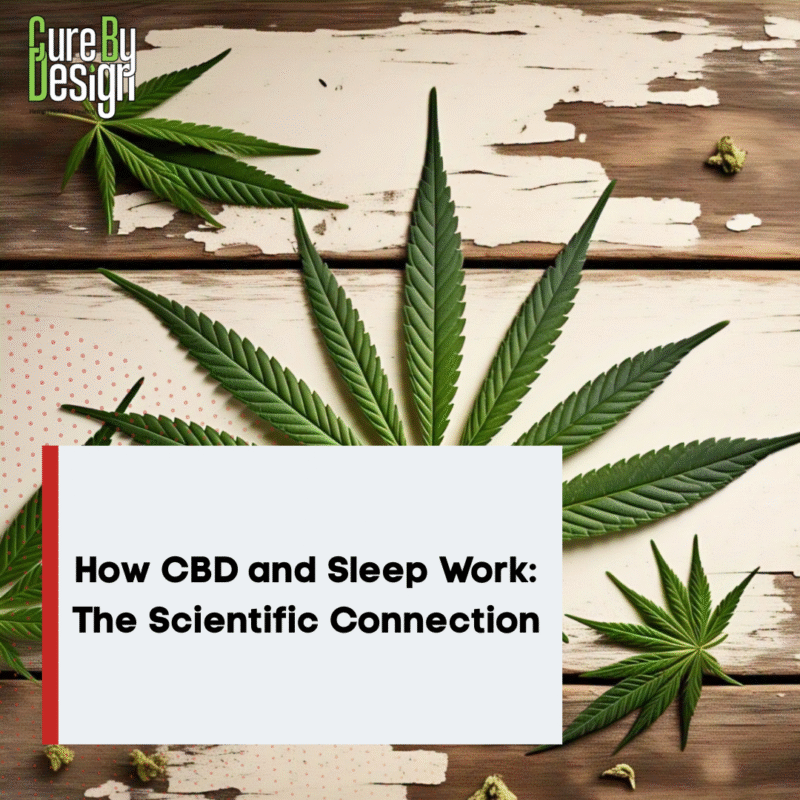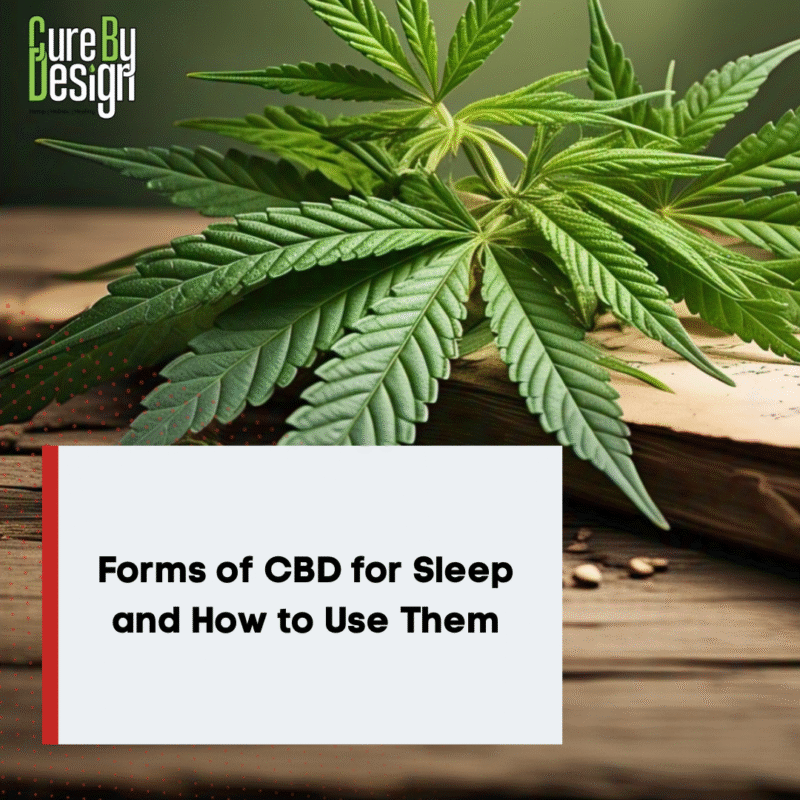
Blog
CBD and Sleep: Understanding the Connection for Better Rest in India

CBD and Sleep, In today’s fast-paced Indian lifestyle, a good night’s sleep has become more of a luxury than a routine. Between erratic work hours, digital distractions, environmental stressors, and health conditions, millions of Indians are struggling with poor sleep quality. While many turn to prescription drugs or home remedies, an increasing number are exploring a safer, more natural alternative: CBD (Cannabidiol).
At Cure By Design, we believe in empowering people with plant-based solutions for real problems. In this guide, we’ll dive into the science of CBD and sleep, explore different CBD forms, and explain how it can help you sleep better, naturally and effectively.
Why Sleep Matters More Than Ever
Sleep isn’t just rest-recovery, regulation, and rejuvenation. Chronic lack of sleep is directly linked to:
- Weakened immunity
- Increased anxiety and depression
- Weight gain and diabetes
- High blood pressure and heart disease
- Reduced productivity and memory loss
And yet, surveys suggest that over 33% of urban Indians suffer from sleep disorders or disturbances. Common culprits? Anxiety, stress, chronic pain, screen time, and irregular lifestyles.
What is CBD? A Natural Compound for Restorative Sleep

CBD (Cannabidiol) is a non-psychoactive compound derived from the hemp plant. Unlike THC, it does not make you high. Instead, it interacts with your body’s endocannabinoid system (ECS), a network of receptors that regulate sleep, mood, pain, and immune response.
Key Terms You Should Know:
- ECS (Endocannabinoid System): Regulates your body’s balance (homeostasis)
- CB1 and CB2 Receptors: Found in the brain and body, influencing sleep cycles
- Cannabinoids: Plant compounds like CBD that work with your ECS
It helps restore balance by calming the mind, relieving pain, and improving your natural sleep-wake rhythm.
How CBD and Sleep Work: The Scientific Connection

1. Reduces Anxiety and Calms the Mind
Stress is one of the biggest barriers to sleep. It has anxiolytic (anti-anxiety) properties that help reduce cortisol levels and promote relaxation.
A 2019 study published in The Permanente Journal found that 79% of participants experienced reduced anxiety and 67% reported better sleep within the first month of its uses.
2. Regulates the Sleep-Wake Cycle
It interacts with the endocannabinoid system (ECS), which plays a crucial role in maintaining circadian rhythms. The ECS contains CB1 and CB2 receptors throughout the brain and body that help regulate sleep patterns.
Research published in Neuropsychopharmacology (2017) demonstrated that it can influence the release of cortisol, helping normalize the body’s natural sleep-wake cycle and promoting deeper, more restorative sleep phases.
3. Reduces REM Sleep Behavior Disorder
It has shown promise in treating REM sleep behavior disorder, a condition where people act out their dreams.
A 2014 study in the Journal of Clinical Pharmacy and Therapeutics found that It reduced the frequency of REM sleep disturbances in Parkinson’s patients.
The compound appears to modulate REM sleep without suppressing it entirely, unlike some traditional sleep medications that can disrupt natural sleep architecture.
4. Alleviates Chronic Pain That Disrupts Sleep
Chronic pain is a leading cause of sleep disruption. Its anti-inflammatory and analgesic properties can help reduce pain-related sleep disturbances.
A 2018 review in Frontiers in Pharmacology highlighted Its ability to reduce inflammatory cytokines and interact with pain receptors, potentially breaking the cycle of pain-induced insomnia.
5. Modulates GABA Neurotransmitter Activity
It influences gamma-aminobutyric acid (GABA), the brain’s primary inhibitory neurotransmitter responsible for promoting relaxation and sleep. While it doesn’t directly bind to GABA receptors like benzodiazepines, it enhances the receptor’s ability to bind with GABA.
Research from 2017 in Current Neuropharmacology suggests this indirect action promotes calmness without the dependency risks associated with traditional sleep aids.
6. Reduces Core Body Temperature
It may help initiate sleep by promoting a slight drop in core body temperature, which naturally occurs before sleep onset. This thermoregulatory effect signals to the body that it’s time to rest.
Studies indicate that Its interaction with the hypothalamus, which controls body temperature, may contribute to this sleep-promoting effect.
7. Addresses Sleep Apnea Symptoms
Preliminary research suggests It may help with sleep apnea by reducing inflammation in the airways and potentially stabilizing sleep patterns.
A 2013 study in Frontiers in Psychiatry found that synthetic cannabinoids reduced sleep apnea episodes in animal models.
While more human studies are needed, early findings suggest Its anti-inflammatory properties may help reduce the airway inflammation that contributes to sleep apnea.
8. Supports Healthy Sleep Duration
Unlike THC, which can cause grogginess and disrupt sleep architecture, it appears to promote optimal sleep duration without next-day drowsiness.
Research published in Medicines (2019) found that its users reported sleeping 7-8 hours on average, within the recommended range for adults.
The compound seems to help people fall asleep faster and stay asleep longer without interfering with natural sleep stages.
9. Balances Adenosine Levels
Adenosine is a neurotransmitter that builds up during wakefulness and promotes sleepiness. It may help regulate adenosine reuptake, allowing this “sleep pressure” chemical to accumulate naturally throughout the day.
This mechanism differs from caffeine, which blocks adenosine receptors, and may explain why it promotes natural sleepiness without the crash associated with stimulant withdrawal.
10. Reduces Nighttime Cortisol Levels
Elevated nighttime cortisol is a common cause of insomnia.
Research published in Current Pharmaceutical Design (2014) showed that it can help normalize cortisol secretion patterns, reducing the stress hormone’s interference with sleep.
By supporting healthy cortisol rhythms, it helps restore the natural rise and fall of this hormone that’s essential for proper sleep-wake cycles.
CBD for Sleep Disorders: What Can It Help With?

It has shown promise in helping with various sleep-related conditions common in India:
Insomnia
Helps reduce the time taken to fall asleep and increases total sleep time. Clinical studies reveal that its users typically experience 30-40% faster sleep onset compared to placebo groups. The compound’s ability to quiet racing thoughts and reduce bedtime anxiety makes it particularly effective for stress-induced insomnia, which affects millions of Indians dealing with work pressure and urban lifestyle challenges.
Restless Leg Syndrome (RLS)
CBD’s muscle-relaxing properties may ease the involuntary leg movements disrupting sleep. Research indicates that its interaction with dopamine pathways, which are often dysregulated in RLS patients, can significantly reduce symptom severity. Many users report decreased leg discomfort and fewer nighttime awakenings, leading to more consolidated sleep patterns and improved daytime energy levels.
Sleep Apnea (adjunct use)
Though not a cure, CBD can ease anxiety and improve overall rest in those undergoing CPAP therapy. Studies suggest its anti-inflammatory effects may help reduce upper airway inflammation, while its anxiolytic properties make CPAP mask tolerance easier. Patients often report better sleep quality scores and reduced daytime fatigue when combining it with their prescribed sleep apnea treatments.
PTSD & Nightmares
CBD may reduce REM behavior disorders, which can be especially helpful in trauma-related sleep disturbances. Veterans and trauma survivors using it show decreased nightmare frequency and intensity in clinical trials. The compound’s ability to modulate fear memory consolidation during REM sleep helps break the cycle of recurring traumatic dreams that fragment sleep architecture.
Perimenopausal and Menopausal Sleep Issues
For women, CBD can relieve hot flashes, anxiety, and restlessness tied to hormonal changes. Research demonstrates that CBD’s interaction with the endocannabinoid system helps regulate body temperature fluctuations and mood swings common during menopause. Women report significant improvements in sleep continuity, reduced night sweats, and better overall sleep satisfaction when incorporating CBD into their wellness routine.
Forms of CBD for Sleep and How to Use Them

At Cure By Design, we offer a range of hemp-based CBD products, each tailored to different preferences and needs.
CBD Oil (Sublingual Tinctures)
- Fast-acting (30–45 mins)
- Easy to control dosage
- Ideal for regular use
How to use: Place 5–10 drops under your tongue 30 minutes before bedtime.
CBD Gummies
- Delicious and discreet
- Best for newcomers
- Slower onset but longer-lasting
When to use: 1–2 gummies in the evening after dinner.
CBD Infused Tea
- Combines CBD with relaxing herbs
- Perfect for bedtime rituals
- Helps unwind both mind and body
CBD Capsules
- No taste, easy to swallow
- Consistent, slow release
- Best for people with chronic insomnia
Finding the Right CBD Dose for Sleep
There’s no one-size-fits-all dosage. Factors like body weight, metabolism, and sleep issues play a role.
General Dosing Guidelines:
- Beginner: 10–15 mg
- Moderate: 20–40 mg
- Severe issues: 50 mg and above
Start low and go slow. Observe how your body responds for at least a week before adjusting.
Side Effects and Safety: What You Should Know
CBD is generally well-tolerated, but some users may experience:
- Drowsiness
- Dry mouth
- Light-headedness
- Mild digestive discomfort
These are rare and usually dose-dependent.
Is CBD legal in India?
Yes. Hemp-based CBD with less than 0.3% THC is legal under Ayurvedic licensing. Cure By Design’s products are AYUSH-certified, FSSAI-compliant, and third-party tested.
How Cure By Design Stands Out
- Made in India using organically grown hemp
- Full-spectrum options for maximum benefit
- Transparent labeling and lab reports
- Dedicated customer support and doctor consultations
- Range of vegan and cruelty-free CBD products
We’re not just selling CBD, we’re shaping a sleep wellness revolution in India.
Still Wondering If CBD Can Help You Sleep?

Let’s recap the benefits:
| Concern | CBD Benefit |
| Anxiety & Stress | Calms the mind |
| Pain & Discomfort | Reduces inflammation |
| Poor Sleep Quality | Promotes deeper sleep stages |
| Irregular Sleep Cycles | Regulates circadian rhythm |
| Hangover from Sleep Pills | No grogginess, no dependency |
Take Control of Your Sleep Naturally.
Join the thousands of Indians already embracing better rest through CBD. No side effects. No chemicals. Just pure, plant-based support from Cure By Design.
Explore our Sleep Collection.
Need help choosing the right product? Book a consultation with our certified wellness experts.












